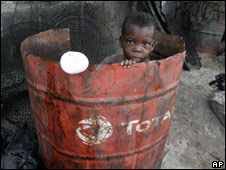Attacks on oil industry facilities and kidnappings for ransom are frequent in the creeks of the Niger Delta, which is home to Africa’s biggest oil and gas industry.
The BBC’s Sue Lloyd-Roberts argues that Nigeria’s “black gold” has brought wealth to a few but fuels greed and corruption on a grand scale.
 After spending just two weeks in Nigeria, I had come to a sweeping – and therefore probably wrong – conclusion about the country.
After spending just two weeks in Nigeria, I had come to a sweeping – and therefore probably wrong – conclusion about the country.
I was therefore gratified to find my view confirmed by the Nigerian woman whom I sat next to on the flight back from Abuja to London. I told her that I had spent most of my time in the Delta region filming the consequences of oil exploration.
“Oh, I come from there”, she said. “I wish you had come to my country before oil was discovered. Oil has ruined Nigeria.”
Academics call it “the curse of the resource-rich country”.
Government income
Oil has provided hundreds of billions of pounds in revenue for the government since it was discovered in the Nigerian Delta 50 years ago and yet the country boasts some of the poorest communities in West Africa.
Elections are rigged by money and guns and corruption pervades society from the top down.
It is not just the billions of petro-dollars which former dictators like General Abacha squirrel away into Swiss bank accounts.
“The idea that there is a huge pot of black gold out there for the taking has distorted everyone’s values,” is how Nnamdi Obasi of the International Crisis Group explained it to me.
 Against the backdrop of the marble mansions belonging to oil barons which line the avenues of the capital, Abuja, he explains that his people have lost track of the connection between effort and reward.
Against the backdrop of the marble mansions belonging to oil barons which line the avenues of the capital, Abuja, he explains that his people have lost track of the connection between effort and reward.
They see fabulous sums of wealth and cannot quite make out how it is accumulated and so no one works in a systematic way towards making money, he explains.
A government that earns £30bn ($42bn) a year from oil does not need to collect income tax.
In the Delta region, where the oil is extracted, there is 90% unemployment. The government does not need money from pay-as-you-earn schemes but it gets it anyway.
So what is left for an unemployed person to do?
International operation
We get one answer from those Nigerian e-mail scams. You know the one… the polite, sad e-mail from a recently bereaved gentleman in Lagos who explains that his dear uncle called Blessed has just died leaving him £10,000.
You have to open a joint bank account in the UK with your new Nigerian friend and put £1,000 in it. He will, of course, have to use that money for administrative reasons and then share the bigger sum with you.
Someone must fall for it. I get these e-mails all the time.
If you are not a politician at the top, or a savvy e-mail writer, but an unemployed person in the Nigerian Delta, what do you do?
Perhaps you steal the oil (up to 200,000 barrels are stolen a day)?
Some break into the pipes found throughout the region, siphon off the oil and load it on to tankers anchored outside Lagos. They bribe customs officials and get the oil refined in Rotterdam or elsewhere.
It is a sophisticated, international operation which saw oil revenue in the Delta slump by some 25% last year.
The Nigerian army and navy try to tackle the problem.
I was impressed by what I saw of their activity out on patrol with them as they stopped and searched boats in the creeks of the Delta during the day and at night as they searched cars for weapons on land.
And then, the following morning, I read in the local paper that eight members of the Nigerian army – including a colonel – had been imprisoned for selling their arms to the gangs they were meant to eliminate.
They too want their share.
Greed and destruction
A journalist working in the Nigerian Delta must look at the environmental degradation in the area.
A straightforward enough task, you would think.
Oil spills are routine and oil companies would be expected to clean them up.
I was directed to one spectacular spill in a local bay which, locals say, occurred at the beginning of September but the oil company involved did not check it out until November. “Disgraceful!” I say to the head of the oil company concerned.
He smiles at me sadly and explains that, in his country, it is commonplace for spills not to be reported immediately because the larger the spill, the greater the scope for compensation claims.
It is simply the way, I was told, that local people can get their share of the pot of black gold.
Having seen the oil spread across the bay of sand and interviewed fishermen who had lost their livelihood, I looked at my interviewee in disbelief.
“The trouble is, you outsiders don’t understand Nigeria,” he said.
He is right. I do not. Apart from what my travelling companion on the flight back to London confirmed: that oil has destroyed the country.
Courtesy: news.bbc.co.uk

